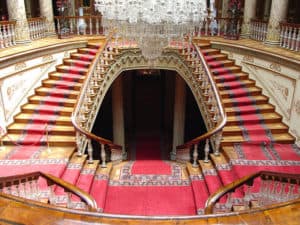Dolmabahçe Palace (Dolmabahçe Sarayı), Turkey’s largest mono-block palace, was
commissioned by Sultan Abdül Mecit in 1843.
Built to belie the military and financial decline of the Ottoman Empire, Istanbul’s first
European-style palace was an opulent one, excessive in size and filled with gold and
crystal.
 |
| Dolmabahçe Palace |
Dolmabahçe Means Filled Garden
The area where the Dolmabahçe Palace now stands used to be a small bay of the
Bosphorus. From the 18th century onwards, the bay was gradually filled to become an
imperial garden by the Bosphorus. People referred to it as Dolmabahçe, literally
meaning filled (dolma) garden (bahçe).
Since the sultans loved the site a lot, plenty of mansions (köşk) and pavilions (kasır)
were built on that spot during the 18th and 19th centuries. Gradually this collection
grew into a complex called the Beşiktaş Waterfront Palace, demolished by order of
Sultan Abdül Mecit to make way for the Dolmabahçe Palace. He decided to move
from Topkapi Palace to Dolmabahçe Palace since it would be able to provide ‘modern’
luxuries that Topkapi Palace lacked.
Extravagant Palace
The true reason behind the construction of
Dolmabahçe Palace was to cover up that
the Ottoman Empire was in decline.
Therefore, the new palace had to be
lavishly decorated to impress the world. It
also had to break with the Ottoman
tradition of constructing a series of pavilions, so he ordered the leading Ottoman
architect Garabet Baylan and his son Nigoğayos to build a mono-block Ottoman-
European palace. The construction began in 1843 and was finished in 1856.
The result is a two-floor palace, covering an area of 45.000 m², containing 285 rooms,
44 halls, 68 toilets and 6 baths (hamam). The design is a mixture of Baroque, Rococo,
Neo-Classic and traditional Ottoman art and culture. Fourteen tons of gold were used
to gild the ceilings. It also has the largest collection of Bohemian and Baccarat crystal
chandeliers in the world. The price tag for all this: a staggering five million Ottoman
gold coins, the current equivalent of 35 tons of gold.

تعليقات
إرسال تعليق